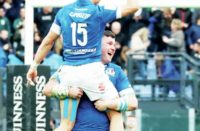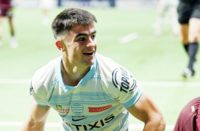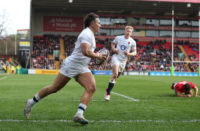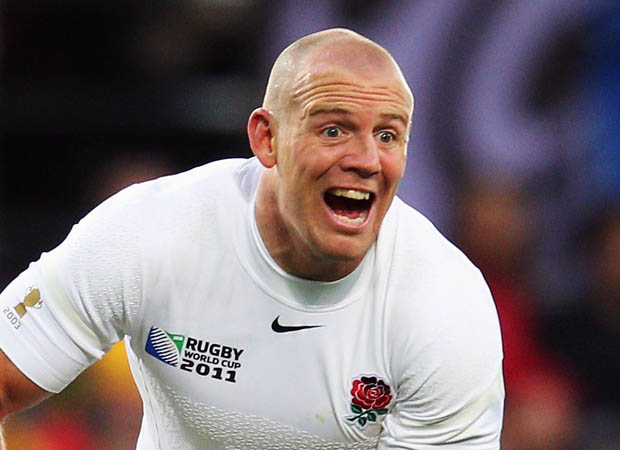 Mike Tindall was the recipient this week of one of the most striking eulogies given by Sir Clive Woodward to a member of his world champion squad of 2003. When Tindall, who was the last-man-standing in the current pro game among those World Cup winners, announced his retirement on Tuesday after 17 years at the elite end of the sport, Woodward was fastest out of the blocks.
Mike Tindall was the recipient this week of one of the most striking eulogies given by Sir Clive Woodward to a member of his world champion squad of 2003. When Tindall, who was the last-man-standing in the current pro game among those World Cup winners, announced his retirement on Tuesday after 17 years at the elite end of the sport, Woodward was fastest out of the blocks.
The Woodward valedictory was one to warm the heart of Tindall, and all his admirers. It laid waste the perception left by the sozzled proceedings at the Altitude Bar in Queenstown during the 2011 World Cup, that the big, broken-nosed centre no longer gave a hoot about England.
Woodward described Tindall, who won 75 England caps between 2000 and 2011, as “a rock”. He said that in his pomp in 2003, Tindall was one of the best centres in the world, and in the same class as Brian O'Driscoll – who he put in the shade that year when England romped to a Grand Slam in Dublin.
Woodward said in his column in the Daily Mail: “The ultimate team man, Mike was always at the heart and soul of the group…he was hugely respected by his peers.”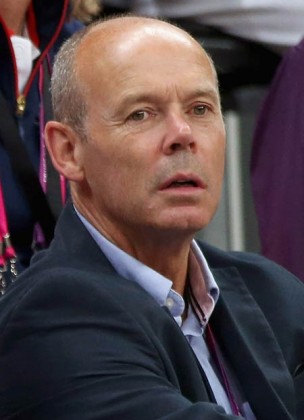
He added: “When Mike was called before the RFU Disciplinary Board after the 2011 World Cup, I had no hesitation in appearing as a character witness for him. I was very proud to do so. I thought it important that somebody reiterated his complete devotion to England over a long career.”
This week in a Rugby Paper exclusive Mike Tindall talked candidly for the first time about the unhappy end to his distinguished England career in 2011, ending in a £15,000 fine for what Rob Andrew described at the time as “a serious breach of (England's) code of conduct”.
Looking back to the events in and around the Queenstown fall from grace the night after the win over Argentina, Tindall told me, “I should never have got as drunk as I did, and that's something I have to deal with. It's not how you would want anything to turn out.”
He explained: “We had that night out, but I didn't wake up the next morning saying, ‘what have we done'? I always enjoyed going out and having a few beers, and a catch-up with the fans. We did that throughout my career, whether we were on tour, in the Six Nations, or in the World Cup, such as in 2003.
“When I first came into the squad guys like Jason Leonard, Darren Garforth and Graham Rowntree enjoyed a beer, and that's what new guys (to the squad in 2000) like myself, Iain Balshaw and Ben Cohen came up with.
“In the past the guys in the media would have had a drink with us after matches, but things change. Papers are more controversial, and eventually that alienates the relationship between them and the players.”
He adds: “Every Saturday at Bath you would play your heart out, have some food quickly, and then stand in the fans' bar until 10.30p.m. having a chat about the game, a laugh and a beer. My attitude was always work hard, play hard. You have to have a balance. For me, rugby has always come first – for instance, I never went to a dinner or social event during the week if I thought it would affect my training or match performance. However, after the work had been done on the pitch on Saturday I took the view that it was time to have a break, relax, and switch off. Any job that becomes 9-to-5 every day in sport can soon become a spiral.”
Tindall concludes: “It's not what happens in the pro game now, and it was the old school side of me coming through. However, it is the social side of rugby that I like and value, and if you take it all away it turns into a sterile game.”
He says, however, that his love of Rugby Union is intact despite the trials and tribulations of 2011, and it is evident as he looks at the changes in the game since he joined Bath straight from school at Queen Elizabeth GS, Wakefield in 1997.
“There are a lot of positives. The standard of rugby has shot up, but because defensive systems and coaching have improved so much there are not as many line-breaks as before. In training there are no more beastings because conditioning is now far more scientific.
“The negatives are that with kids coming straight from school into academies you lose the social aspect. That thing where after a game you talk to fans and sponsors – these days fans take to forums so much because they have less engagement in the pro age with coaches and players. I still love the game -– it is the best sport that this country plays.”
Tindall also has a special affection for Gloucester after the 10 years he spent at Kingsholm after falling out with the Nigel Brownsword regime at Bath. The club's decision not to renew his player-coach contract this season precipitated his retirement, but, having already had one renewal, at 35 it's clear there are no hard feelings.
“I will always stay close to Gloucester – I'm a fan now and all my best mates still play here, so I'll always watch games,” Tindall says. “I have at least another year playing in me…but I also thought that if it wouldn't be a Gloucester, it wouldn't be anywhere. At Gloucester it could work, because if you were crap or injured you could bow out (gracefully), but at a new club it would be more difficult because there would be a lot of pressure and expectation of a new signing. That didn't sit properly, and although you never say never, someone would have to be very persuasive.”
So, what does the immediate future hold? “At the end of last season there were two ways of approaching it. One was to go straight in for a year of coaching, which is what Nigel Davies wanted me to do. The other was to have a break for a year, and pursue other avenues, by the end of which I would know if I had missed coaching and was craving to get back – and that's what I intend to do.”
Given his clear-cut assessment of the current England side, and in particular his views on the midfield permutations Stuart Lancaster has to sift with little over a year to go until the 2015 World Cup, a career in coaching beckons should he want it.
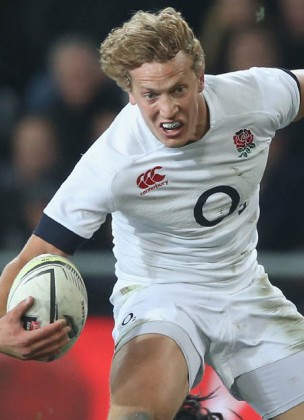 Tindall says Lancaster is spoilt for choice. “Billy Twelvetrees is more established at 12, but if Kyle Eastmond can find his first Test form against New Zealand again he is another who could fit in at inside-centre. Then Manu Tuilagi and Luther Burrell could slug it out at 13, although Henry Trinder could also have a say. On top of that there's Sam Burgess yet to arrive at Bath and also young guys like Sam Hill at Exeter and Ryan Mills, who's now with Worcester.”
Tindall says Lancaster is spoilt for choice. “Billy Twelvetrees is more established at 12, but if Kyle Eastmond can find his first Test form against New Zealand again he is another who could fit in at inside-centre. Then Manu Tuilagi and Luther Burrell could slug it out at 13, although Henry Trinder could also have a say. On top of that there's Sam Burgess yet to arrive at Bath and also young guys like Sam Hill at Exeter and Ryan Mills, who's now with Worcester.”
His solution? “If you had a World Cup tomorrow, I would go with Owen Farrell at 10, Billy Twelvetrees at 12, and a judgement call on Luther or Manu at 13. For me, Twelvetrees and Burrell showed in the Six Nations that they were the better combination. It worked well in my England career when I combined with either Will Greenwood or Mike Catt, because you want a ball-receiver and distributor at 12. The benefit of Twelvetrees at inside-centre is that you have another distributor and kicker who can slot in at 10 when required, giving Farrell greater freedom.”
He continues, “The only way you can play Burrell and Tuilagi together is if you have a different 10 to Farrell, (a play-maker) like George Ford. That way you could afford to play two big carriers.”
However, Tindall believes England have made good headway since Lancaster's first Six Nations. “At first their game was basic, built almost entirely on pressure, and not very much in attack. They were lucky to win those two opening games against Scotland and Italy in 2012, thanks mainly to those Charlie Hodgson charge-downs. But I was really impressed by how they played in the last Six Nations. They want to be the most impressive, aggressive forward pack at the breakdown that there is, and the carrying by all the forwards as well as the speed of ball gives them options in attack.”
He continues: “In the backs the injuries gave Burrell a chance and also with Mike Brown at full-back and two elusive wings (Jonny May and Jack Nowell), they created plenty of attacking opportunities.”
“Before that, with Brad Barritt and Manu Tuilagi at centre and Alex Goode at full-back there was no X-Factor, with the exception of the win over New Zealand. You need people who can create something out of nothing at international level.”
He says that Lancaster's is a building block strategy. “Initially, they put pressure on in defence – and that was behind the win over New Zealand (in 2012). Now, they have put the next layer on, working with dummy runners to create space in attack. If they maintain the rate of improvement, then they could be genuine World Cup contenders.”
Tindall says with the competition for places, which will intensify with back-to-back world champion U20 sides, England are in a good place. Nor was he disheartened by New Zealand upstaging England's up-tempo tactics on the summer tour.
“What we had in 2003 with the ability to play in different ways. We were also good at recognising when one pattern was not working how to switch. But it was a progression – in 2001 we played a crazy game, running from everywhere and scoring lots of tries.
“It was good to play New Zealand at their own game this summer. The 10 minutes they were brilliant (in Dunedin) was when England lost Farrell to the sin-bin.”
However, Tindall says that the losses to Southern Hemisphere sides has to stop this season. “This autumn series is massive, an acid test.
“Beating South Africa in Bloemfontein in 2000 was the catalyst that changed our team…and over the next three years England never lost to a Southern Hemisphere side. This team needs a similar moment, and they will be kicking themselves for not winning the first Test in New Zealand.”
He adds: “This autumn series is a catalyst for them to believe in themselves, and also to sow doubts in the minds of South Africa, New Zealand and Australia. They have already beaten the last two, but they need wins, especially against South Africa.”
Tindall says he will be cheering them on. “I will always be around the sport, I might even take up residency in The Shed.”
Mike Tindall will always be welcome as a star who had time for a chat and a beer with true fans of the game.
*This article was published in The Rugby Paper on July 20


